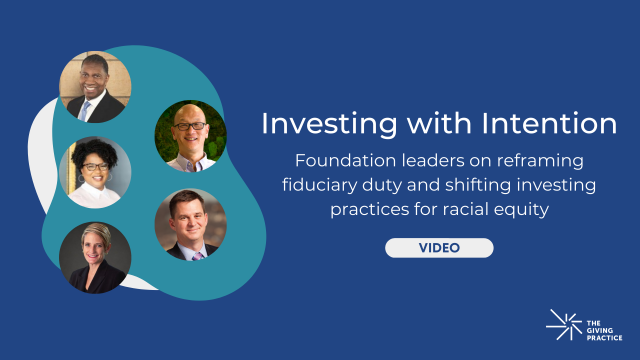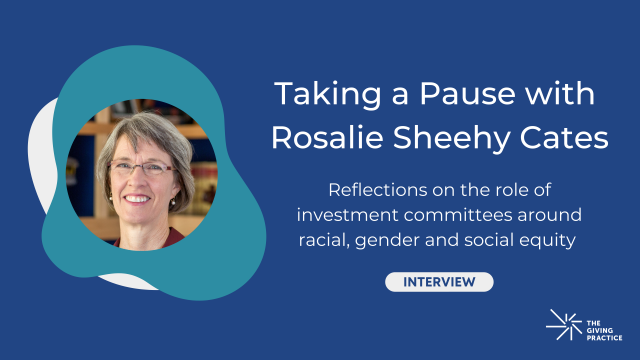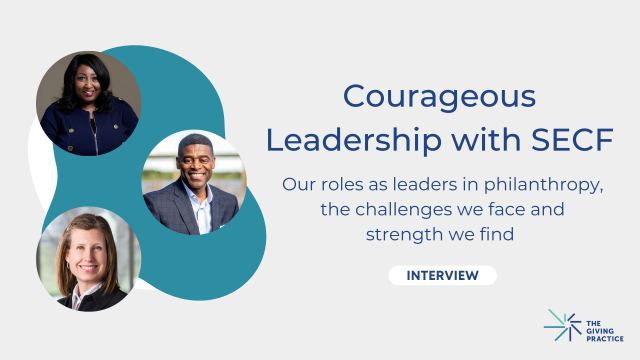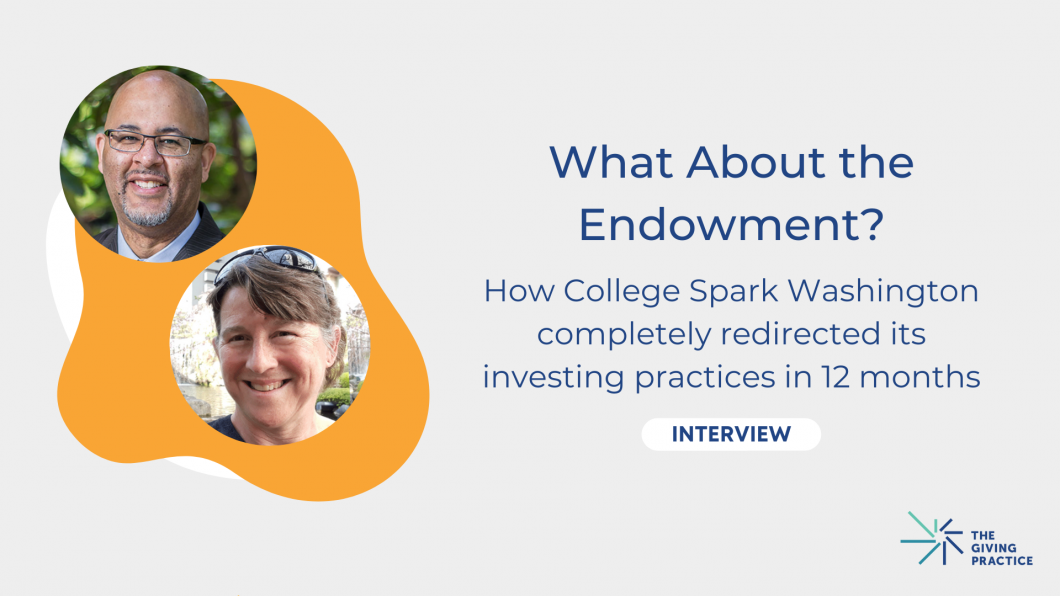
When Warren Brown became the Executive Director of College Spark Washington in April, 2020, his board was open to exploring a new mission that emphasized racial equity in its longstanding college grantmaking program.
One of the board’s big questions, Warren recalls, was: “What about the endowment? We need to be credible when people ask, and we don’t even know if our investments are in line with our racial equity thinking.”
Once they dug in on this question, it took College Spark just 12 months to review and redirect its investing practices. Here are the key steps from their work:
| January 2021 | College Spark adopts a new mission to center racial equity in its theory of action work. |
| June 2021 | The board tasks its finance committee to investigate and make recommendations about mission-aligned endowment investing. |
| July 2021 | The finance committee hosts a full-board learning session on mission investing which solidifies the board’s intention to adopt some form of mission investing. |
| August – November 2021 | Staff research the options and realities of mission-aligned investing. |
| December 2021 - April 2022 | A consultant is brought on board to assist College Spark in a Request for Qualifications process to find an advisor for mission-aligned portfolio management. |
| Today | The finance committee along with Tiedemann Advisors is updating the Investment Policy Statement that will center racial equity. |
We sat down with Warren and Chief Financial Officer Kris Lambright to discuss the work, especially in light of having a staff of six, a board of 15 trustees and a moderate-sized endowment ($120 million in assets).
Here are some of the key messages we heard:
1. Powerful national events plus a new mission naturally led College Spark’s board to examine its investing practices.
It all happened at once: College Spark hired Warren, the pandemic was in full swing and there was a national movement to enact racial equity practices.
These conversations naturally grew into a full-blown mission investing journey for College Spark.
2. The finance committee was fully empowered to dive into the world of mission investing and bring its recommendations to the full board.
The board fully relied upon Kris and the finance committee to explore all the details, all the definitions and all the ideas that College Spark could follow in mission investing. Kris remembers that, as non-board members, some committee members questioned their role and responsibilities, pondering whether they should be suggesting fundamental policy changes for College Spark.
3. Good governance channels and documents really matter.
Kris and Warren credit an excellent governance structure for creating trust and safety among the board committees and with staff members. The chair of College Spark’s finance committee sits on the board’s executive committee, and the board chair also sits on the finance committee.
College Spark also had good, clear committee charters in place.
4. Fiduciary duty is expansive.
As the board explored mission-aligned investing, they asked important questions about the relationship between being a fiduciary and the impact of implementing their new mission.
With these obligations clearly communicated, College Spark trustees were reassured about meeting their fiduciary duty as they explored mission-aligned investing.
5. Trust is built in the midst of the details. The details matter.
Investing is serious business that involves a lot of technical, moving parts. Adding mission criteria shifts the whole pattern of thinking about risk. College Spark’s finance committee was working fast and hard to take it all in.
Keeping everyone on the same page with terms, definitions and decisions required diligent and sustained communication from Warren and Kris. They set up a dedicated board education virtual library for mission investing. They maintained a definitions page. They posted reports. They convened several key learning sessions with outside thought partners. But most of all, they talked and listened to their trustees and finance committee members.
Kris described a continual process of listening carefully to committee members so she could feed back their emerging understanding of mission-aligned investing. She invited this conversation and saw members building new ways of thinking about risk together.
She was clear that the College Spark finance committee worked overtime for about three months, holding “many” extra meetings to immerse itself in the technical and risk considerations of mission-aligned investing.
Warren also underlines that mission-aligned investing is “a big body of work, in its importance, but also in the sheer amount of work.” As executive director, Warren says one-on-one meetings with trustees are “imperative” for bringing out each board member’s thinking. “I began to take those statements from the board members and frame it out, and I could see the nuance in their process."
He went in the weeds, but he also continually framed and re-framed the emerging consensus for his board.
6. Peers are out there to support your investment committee.
College Spark reached out to Philanthropy Northwest early in this journey. Foundation staff attended a training at a Philanthropy Northwest conference, and they contacted us to request peer referrals from Philanthropy Northwest and The Giving Practice.
Through Philanthropy Northwest and TGP, College Spark connected with several peer foundations of the same asset size. Kris says those conversations gave her a lot of confidence. Warren adds that many foundations tend to be private about endowment investing practices, but working within the network gave him access to “people that are on the journey, and not only able to share but willing to share.”
After a year of intense work, College Spark is now working with Tiedemann Advisors on its next phase: “putting all this into practice,” Kris says. Grateful for the help and support they received, they want other foundations to know they are happy to share their experiences and learning on this key governance journey.
Thanks, College Spark Washington, for sharing your work with all of us.
If you are seeking partnership and support on your impact investing journey, please don't hesitate to reach out to Rosalie at rosalie@thegivingpractice.org.
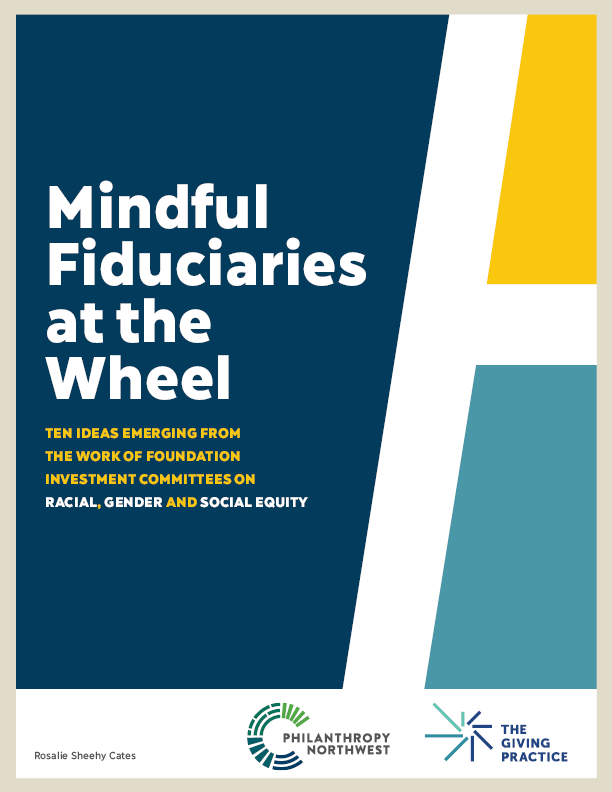 Mindful Fiduciaries at the Wheel explores a new version of fiduciary duty that centers racial, social and gender equity based on extensive interviews with foundation trustees, CIOs, investing staff, outside investing advisors and industry advocates centering equity in investment committees. Across 10 big ideas, we distill key processes and decision points that investment committees encounter along the way.
Mindful Fiduciaries at the Wheel explores a new version of fiduciary duty that centers racial, social and gender equity based on extensive interviews with foundation trustees, CIOs, investing staff, outside investing advisors and industry advocates centering equity in investment committees. Across 10 big ideas, we distill key processes and decision points that investment committees encounter along the way.
Join our mailing list to stay up to date on our latest reflections, insights, interviews and more.









